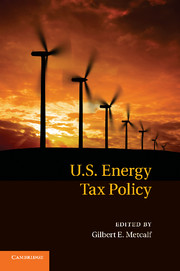Book contents
- Frontmatter
- Contents
- Conference Participants
- 1 Introduction
- 2 Distributional Impacts of Carbon Pricing Policies in the Electricity Sector
- 3 Distributional Impacts of a U.S. Greenhouse Gas Policy
- 4 Instrument Choice Is Instrument Design
- 5 Taxes, Permits, and Climate Change
- 6 Border Adjustments for Carbon Taxes and the Cost of Emissions Permits
- 7 Taxes and Caps as Climate Policy Instruments with Domestic and Imported Fuels
- 8 How Much Should Highway Fuels Be Taxed?
- 9 State Tax Policy and Oil Production
- 10 The Social Costs and Benefits of U.S. Biofuel Policies with Preexisting Distortions
- Index
- References
10 - The Social Costs and Benefits of U.S. Biofuel Policies with Preexisting Distortions
Published online by Cambridge University Press: 01 June 2011
- Frontmatter
- Contents
- Conference Participants
- 1 Introduction
- 2 Distributional Impacts of Carbon Pricing Policies in the Electricity Sector
- 3 Distributional Impacts of a U.S. Greenhouse Gas Policy
- 4 Instrument Choice Is Instrument Design
- 5 Taxes, Permits, and Climate Change
- 6 Border Adjustments for Carbon Taxes and the Cost of Emissions Permits
- 7 Taxes and Caps as Climate Policy Instruments with Domestic and Imported Fuels
- 8 How Much Should Highway Fuels Be Taxed?
- 9 State Tax Policy and Oil Production
- 10 The Social Costs and Benefits of U.S. Biofuel Policies with Preexisting Distortions
- Index
- References
Summary
Introduction
The primary objectives of U.S. biofuel policies are to enhance energy security (reducing dependence on oil), improve the environment (mitigating global climate change and local air pollutants), and increase the prosperity for agriculture (enhancing farm income and promoting rural development while reducing tax costs of farm subsidy programs). In order to achieve these policy goals, several policies have been implemented, but the centerpieces of U.S. policy are federal and state biofuel consumption mandates and consumption subsidies (called tax credits), policies that by themselves do not discriminate against international trade. This is the focus of our chapter.
The implications of mandates and tax credits are analyzed under three different second-best constraints: a suboptimal fuel tax; adding a tax credit with a binding mandate; and interaction effects with the fiscal system in which mandates and tax credits have differential effects on government tax revenues and the size of the fiscal base. In comparing mandates to tax credits under these three preexisting distortions, this chapter does not analyze the welfare economics of policies that discriminate against trade, namely, import barriers, production subsidies, and sustainability standards. Under each second-best constraint, we simply hold ethanol consumption (and hence ethanol and corn prices) the same.
The emerging literature on biofuels has shown that mandates are superior to tax credits (de Gorter and Just 2007, 2008a, 2009b; Lapan and Moschini 2009).
- Type
- Chapter
- Information
- US Energy Tax Policy , pp. 338 - 379Publisher: Cambridge University PressPrint publication year: 2010
References
- 6
- Cited by



